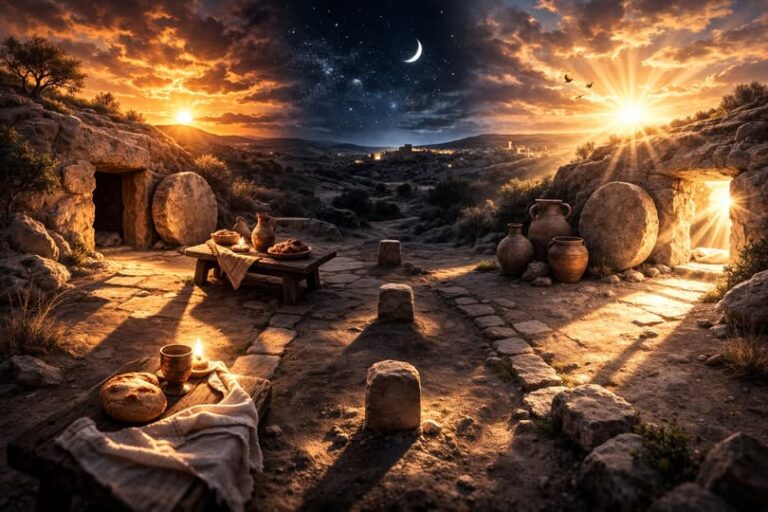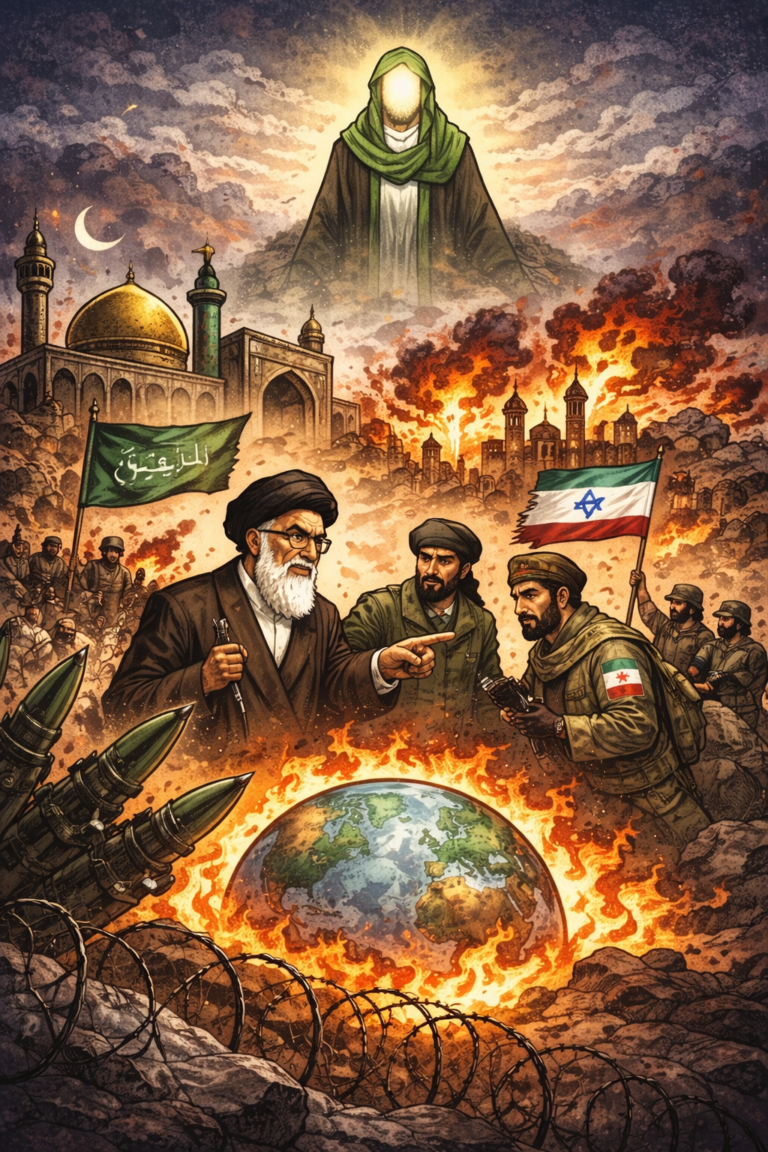
Accademia - Crucifixion by Andrea Previtali
The ancient world was dominated by gods who ruled through fear, demanded endless service, and depended on human offerings to survive. In the mythologies of Mesopotamia, Egypt, and Canaan, the gods created humanity as a labor force to feed, clothe, and maintain them. These deities, though powerful, were limited, bound to the world and its resources.
The God of Israel, Yahweh, is completely unlike these gods. He does not need humanity, nor does He rely on sacrifices to exist or to gain power. Instead, Yahweh creates human beings as His imagers, to reflect His rule and character into the world. Even when they rebel, He moves toward them, not with destruction, but with mercy. Most astonishing of all, He is the God who serves His creation and willingly suffers to redeem it.
Created to Serve versus Created to Represent
In ancient Mesopotamian texts such as the Atrahasis Epic and the Enuma Elish, humanity is created to relieve the gods of labor. The lesser gods, tired of digging canals and farming, rebel against the higher gods. The solution is the creation of humans, formed from clay mixed with the blood of a slain deity. These humans exist to serve the gods’ needs, maintaining temples and offering food, drink, and honor. Their existence is utilitarian. Humanity is expendable, created out of conflict and for the comfort of beings who are themselves dependent.
By contrast, Genesis presents humanity as being made in the image of God, a phrase that carries royal and priestly connotations. Rather than being created as servants in the mundane sense, humans are given authority to rule over creation as God’s representatives. They are told to be fruitful, to multiply, and to steward the earth. Their identity is relational and dignified. Yahweh does not create man to meet His needs, because He has none. He creates them to share in His creative purposes and to dwell in communion with Him.
Divine Need versus Divine Self-Sufficiency
The gods of the ancient world were seen as limited and needy. Temples were constructed as their earthly homes. Rituals were required to wake them, bathe them, clothe them, and feed them. A lapse in sacrifice could provoke divine anger or weaken the gods’ favor. In some myths, the gods even feared humanity growing too numerous or noisy, and sent disasters like plagues or floods to reduce them.
Yahweh, on the other hand, declares His complete independence. In Psalm 50, He says, “If I were hungry, I would not tell you, for the world is mine, and all that is in it.” In Acts 17, Paul proclaims that God is not served by human hands, as though He needed anything. Yahweh is the Creator of all, not sustained by creation. He gives life and breath to all things, and nothing sustains Him.
This does not mean Yahweh rejected sacrifice altogether. Sacrifices were central to the worship of Israel, but not because God needed food or payment. Instead, sacrifices were a means by which sinful people could draw near to a holy God. The offerings were symbolic, allowing for purification, atonement, and covenant renewal. Far from sustaining Yahweh, they allowed humans to enter His presence without being consumed by His holiness.
Engaged, Not Distant
The gods of the ancient world were powerful but aloof. When they did involve themselves in human affairs, it was usually to protect their own interests or to punish offenses. They could be bribed, manipulated, or provoked. Their relationships with mortals were transactional and often exploitative.
Yahweh, in contrast, is deeply involved in the lives of His people. He walks with Adam in the garden. He speaks to Abraham as a friend. He wrestles with Jacob. He hears the cries of the oppressed and comes to deliver them. His engagement is not for His benefit, but for theirs. He binds Himself in covenant, not because He must, but because He loves.
This self-giving love reaches its most profound expression in the incarnation of the Son. According to Christian theology, the Second Person of the Trinity, eternally divine and distinct from the Father and the Spirit, takes on human flesh in the person of Jesus Christ. He does not come to be served, but to serve, and to give His life as a ransom for many. As Paul writes in Philippians 2, though He existed in the form of God, He humbled Himself, taking the form of a servant, and became obedient to death, even death on a cross.
This is not a god who demands blood to maintain power, but the true God who offers His own to restore relationship.
Destruction versus Redemption
In the myths of the nations, humanity’s failure often leads to wrath and annihilation. In the Atrahasis Epic, the gods are disturbed by human noise and decide to wipe them out with a flood. Only one man and his family are spared, and only after one god secretly warns him. The flood is not about sin or justice, but convenience.
In the Bible, though God does judge the world in a flood, it is not because humanity annoyed Him, but because violence and corruption had filled the earth. Even in judgment, God preserves a remnant and reaffirms His desire to bless the world through His creation. Later, when Israel fails to uphold their covenant, God again moves to restore rather than destroy. He sends prophets. He calls for repentance. Ultimately, He sends His Son.
This is a God who absorbs the consequences of sin into Himself. Rather than discarding the world, He enters it to redeem it. The mission is not exploitation, but restoration.
Conclusion: The God Who Gives
The gods of the ancient world demanded everything and gave little in return. They created humanity for their benefit, required constant attention, and offered no ultimate hope. Yahweh stands apart. He needs nothing from humanity, yet gives them everything. He creates them in His image, calls them into relationship, provides a way back when they fall, and in the fullness of time, gives Himself for their salvation. This is the God who serves, not because He is weak, but because He is good.
Discussion Questions:
- How does the concept of humanity being made in the image of God differ from the way humans were viewed in Ancient Near Eastern creation myths, and what implications does that have for human dignity and purpose?
- Why is it significant that Yahweh required sacrifices not to sustain Himself, but to make a way for people to enter His presence? How does that reshape our understanding of worship and holiness?
- In what ways does the incarnation of Christ reveal a fundamentally different view of divine power and love compared to the gods of surrounding nations, and how should this influence the way Christians view leadership, service, and sacrifice?
Want to Know More?
- Michael S. Heiser, The Unseen Realm: Recovering the Supernatural Worldview of the Bible
This book explores the biblical concept of the Divine Council and contrasts the God of Israel with the gods of the nations, showing how Yahweh’s relationship with His imagers sets Him apart in the ancient world. Heiser draws heavily from ancient Near Eastern texts, biblical theology, and Second Temple literature to present a clear picture of Yahweh’s uniqueness. - John H. Walton, Ancient Near Eastern Thought and the Old Testament: Introducing the Conceptual World of the Hebrew Bible
Walton provides a thorough comparison between the worldview of Israel and that of its neighbors, especially regarding creation, deity, law, and humanity. He explains how Israel’s theology was both situated within and distinct from the surrounding cultures. - Daniel I. Block, For the Glory of God: Recovering a Biblical Theology of Worship
This book examines worship throughout Scripture and clearly explains the purpose of the sacrificial system in ancient Israel. Block emphasizes that sacrifices were about relationship and access to God, not divine sustenance, making this a strong theological resource that supports the article’s claims.




